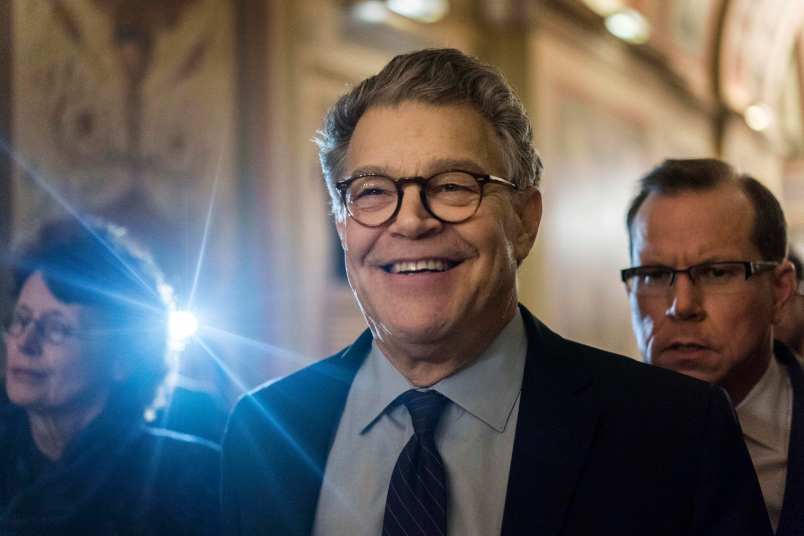MINNEAPOLIS (AP) — Nearly a year after he resigned his U.S. Senate seat amid sexual misconduct allegations, Al Franken is testing whether he can make a comeback in the #MeToo era.
The former “Saturday Night Live” funnyman released a podcast on health care this week, just days after a Thanksgiving Day Facebook post in which he mused how much he missed “being in the fight every day.”
“When I left the Senate I said I was giving up my seat but not my voice, and after the midterm elections I thought I’d start experimenting with ways to make my voice heard,” Franken said as he opened the podcast. He ended by saying: “Maybe I’ll do another one, I don’t know.”
Franken was a safe bet for re-election before a radio host last year accused him of forcibly kissing her during a USO tour in the Middle East in 2006, and circulated a photo in which he can be seen pretending to grope her breasts. That was followed by allegations from several women that he groped them while posing for photos.
Several female Democratic senators led by New York Sen. Kirsten Gillibrand responded to the allegations by calling on Franken to step down, and he announced his resignation in December, even as he maintained that some of the accusations were untrue and disputed details in others.
Franken, 67, was among the first politicians who fell amid the rise of the #MeToo movement. But others have survived misconduct allegations since then, including U.S. Rep. Keith Ellison, who was elected Minnesota’s attorney general this month despite an ex-girlfriend’s claim of domestic abuse. And Brett Kavanaugh was confirmed to the U.S. Supreme Court despite an allegation of attempted sexual assault.
Many liberal activists and donors nationally have argued that Franken was treated too harshly. Comedian Bill Maher recently argued on his HBO show “Real Time” that “We can have #MeToo and Al Franken. They’re not mutually exclusive. It’s time to get Al off the bench so he could come back to doing what he does better than any other Democrat, taking down right-wing blowhards.”
Even President Donald Trump ridiculed Franken for quitting too soon. At a rally in Minnesota last month for the Republican running in a special election to complete Franken’s term, Trump told the crowd that Franken folded “like a wet rag.”
“Man. … He was gone so fast. It was like, ‘Oh, he did something, oh, oh, oh, I resign. I quit, I quit.’ Wow,” Trump said.
Franken declined an interview request, and he hasn’t made clear yet exactly how he will seek to become more publicly involved. He said in his Facebook post that he is “certainly not running for anything.” Even if he was interested, Minnesota’s Senate seats and governorship are locked down for the near future by fellow Democrats.
And some are warning against rushing to welcome Franken back.
“No matter how much you care about him or his voice or his talents as an orator, that does not trump the need to create a more just culture for the survivors of sexual violence,” said feminist author Sady Doyle, a regular contributor to Elle and Medium who said she was once a big Franken fan.
If he does return, influencing policy would seem a natural path. Franken cultivated an image as a serious policy wonk in the Senate, with a particular interest in technology issues such as net neutrality. He’s also seen as having influence with Democratic donors.
Norm Ornstein, a close friend of Franken’s for 30 years who is also a resident scholar at the American Enterprise Institute, a conservative-leaning Washington think tank, said he and Franken have had discussions since the midterm election about how Franken might play a public role again.
Ornstein said Franken had “a really important voice in the Senate” before his fall, and his recent steps show “that he’s moving cautiously, deliberately and with some humility to find that voice.”
Health policy, social justice, technology, the environment, agriculture and the future of democracy are some of the issues Franken feels most passionately about, Ornstein said. They’re going to be critical issues going into the 2020 election, he said, and they’re issues on which Franken could once again be an influential voice. He said the health care podcast showed that Franken knows how to have “informative and entertaining” discussions that can deepen the public’s understanding of important issues and potentially tee up issues for candidates in 2020.
University of Minnesota political scientist Larry Jacobs said Franken can help set the Democratic agenda. Franken still has “enormous leverage” in the party because of his demonstrated fundraising ability, Jacobs said, adding that he believes Franken could revive his national network of donors on behalf of progressive candidates.
“There’s a big space here for Al Franken,” Jacobs said. “And it may well be the right timing because we’re past 2018, moving to 2020. Franken’s gifts as a communicator, his ability to counter Trump, plus that extraordinary donor base, are and will be in high demand. Plus there’s genuine remorse among progressives (who think) that he was unfairly treated, too harshly treated.”
But some aren’t buying it.
“Even after being forced out of the U.S. Senate by his fellow Democrats a year ago, Franken seems to refuse to accept responsibility for his actions,” said Brian McClung, a Republican strategist who was spokesman for former GOP Gov. Tim Pawlenty. “Eight women accused him of sexual harassment. While people deserve second chances and the opportunity to redeem themselves, Franken has a long, long way to go.”



